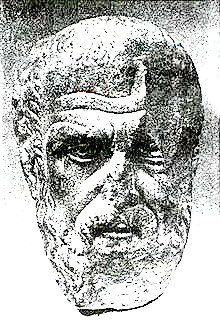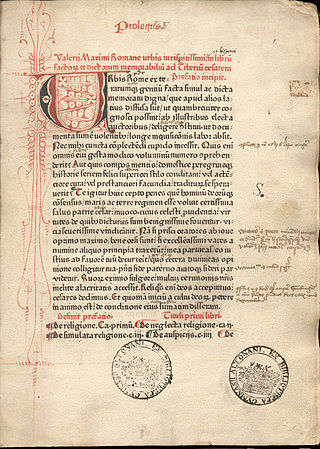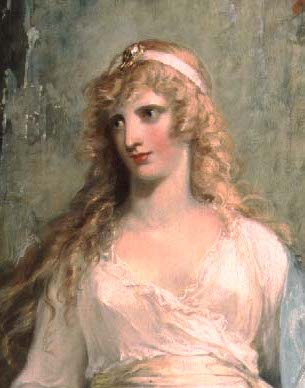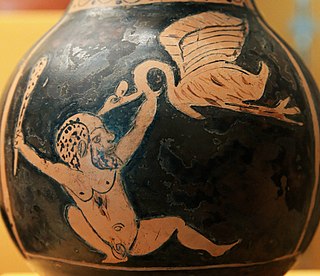
Quintus Ennius was a writer and poet who lived during the Roman Republic. He is often considered the father of Roman poetry. He was born in the small town of Rudiae, located near modern Lecce, Apulia,, a town founded by the Messapians, and could speak Greek as well as Latin and Oscan. Although only fragments of his works survive, his influence in Latin literature was significant, particularly in his use of Greek literary models.

In Greek mythology, Adonis was the mortal lover of the goddess Aphrodite and Persephone, who was famous for having achieved immortality. He was widely considered to be the ideal of male beauty in classical antiquity.

Arrian of Nicomedia was a Greek historian, public servant, military commander, and philosopher of the Roman period.

Lucius Cassius Dio, also known as Dio Cassius, was a Roman historian and senator of maternal Greek origin. He published 80 volumes of the history of ancient Rome, beginning with the arrival of Aeneas in Italy. The volumes documented the subsequent founding of Rome, the formation of the Republic, and the creation of the Empire up until 229 AD, during the reign of Severus Alexander. Written in Ancient Greek over 22 years, Dio's work covers approximately 1,000 years of history. Many of his 80 books have survived intact, or as fragments, providing modern scholars with a detailed perspective on Roman history.

Valerius Maximus was a 1st-century Latin writer and author of a collection of historical anecdotes: Factorum et dictorum memorabilium libri IX. He worked during the reign of Tiberius.

In Greek mythology, Calypso was a nymph who lived on the island of Ogygia, where, according to Homer's Odyssey, she detained Odysseus for seven years. She promised Odysseus immortality if he would stay with her, but Odysseus preferred to return home.

Scribonia was the second wife of Octavian, later the Roman Emperor Augustus, and the mother of his only biological child, Julia the Elder. Through her youngest daughter she was the mother-in-law of the Emperor Tiberius, great-grandmother of the Emperor Caligula and Empress Agrippina the Younger, and great-great grandmother of the Emperor Nero.
The gens Scribonia was a plebeian family of ancient Rome. Members of this gens first appear in history at the time of the Second Punic War, but the first of the Scribonii to obtain the consulship was Gaius Scribonius Curio in 76 BC.

Lucius Orbilius Pupillus was a Latin grammarian of the 1st century BC, who taught at school, first at Benevento and then at Rome, where the poet Horace was one of his pupils. Horace criticizes his old schoolmaster and describes him as plagosus, and Orbilius has become proverbial as a disciplinarian pedagogue.

The Dictionary of Greek and Roman Biography and Mythology is an encyclopedia and biographical dictionary of classical antiquity. Edited by William Smith, the dictionary spans three volumes and 3,700 pages. It is a classic work of 19th-century lexicography. The work is a companion to Smith's Dictionary of Greek and Roman Antiquities and Dictionary of Greek and Roman Geography.
Agamede was a name attributed to two separate women in classical Greek mythology and legendary history.

Gerana, sometimes also called Oenoe, is a queen of the Pygmy folk in Greek mythology, who incurred the wrath of the goddess Hera and was subsequently turned into a bird bearing her name, the crane. This aetiological tale explains the ancient rivalry between the Pygmies and the cranes, and also serves as a cautionary tale against the people who hubristically claimed to be better than even the gods themselves. Gerana's story bears some resemblance to that of Lamia, who was also a beautiful woman cursed by Hera and transformed into something unappealing.
Eutychius Proclus was a grammarian who flourished in the 2nd century AD. He served as one of two Latin tutors for the Roman emperor Marcus Aurelius, along with Trosius Aper. He was from the North African city of Sicca Veneria.

The role of women in ancient warfare differed from culture to culture. There have been various historical accounts of females participating in battle.
Julia Balbilla was a Roman noble woman and poet. Whilst in Thebes, touring Egypt as part of the imperial court of Hadrian, she inscribed three epigrams which have survived.
Marcus Livius Drusus Libo was an ancient Roman consul of the early Roman Empire. He was the son of Lucius Scribonius Libo and adopted brother of the empress Livia. His natural paternal aunt was Scribonia, the second wife of Augustus, as a consequence of which he was a maternal first cousin of Julia the Elder.
Sulpicia was an ancient Roman poet who was active during the reign of the emperor Domitian. She is mostly known through two poems of Martial; she is also mentioned by Ausonius, Sidonius Apollinaris, and Fulgentius. A seventy-line hexameter poem and two lines of iambic trimeter attributed to her survive; the hexameters are now generally thought to have been a fourth- or fifth-century imitation of Sulpicia. Judging by the ancient references to her and the single surviving couplet of her poetry, Sulpicia wrote love poetry discussing her desire for her husband, and was known for her frank sexuality.
Esther Eidinow is a British ancient historian and academic. She specialises in ancient Greece, particularly ancient Greek religion and magic. She has been Professor of Ancient History at the University of Bristol since 2017.
Tyrannion, son of Artemidorus (Ἀρτεμίδωρος), was a Greek sophist from Phoenicia around the 1st century BCE. He was a pupil of Tyrannion of Amisus. He is also known as Tyrannion the Younger and his teacher as Tyrannion the Elder. His original name was Diocles (Διοκλῆς), and changed it to Tyrannion to honor his teacher.
In Greek mythology, Myrmex is a young maiden who became a favourite of the goddess Athena. Her story survives in the works of fifth-century AD Latin grammarian Maurus Servius Honoratus.
![]() This article incorporates text from a publication now in the public domain : Smith, William (1870). "Aphrodisius, Scribonius". In Smith, William (ed.). Dictionary of Greek and Roman Biography and Mythology . Vol. 1. p. 224.
This article incorporates text from a publication now in the public domain : Smith, William (1870). "Aphrodisius, Scribonius". In Smith, William (ed.). Dictionary of Greek and Roman Biography and Mythology . Vol. 1. p. 224.









